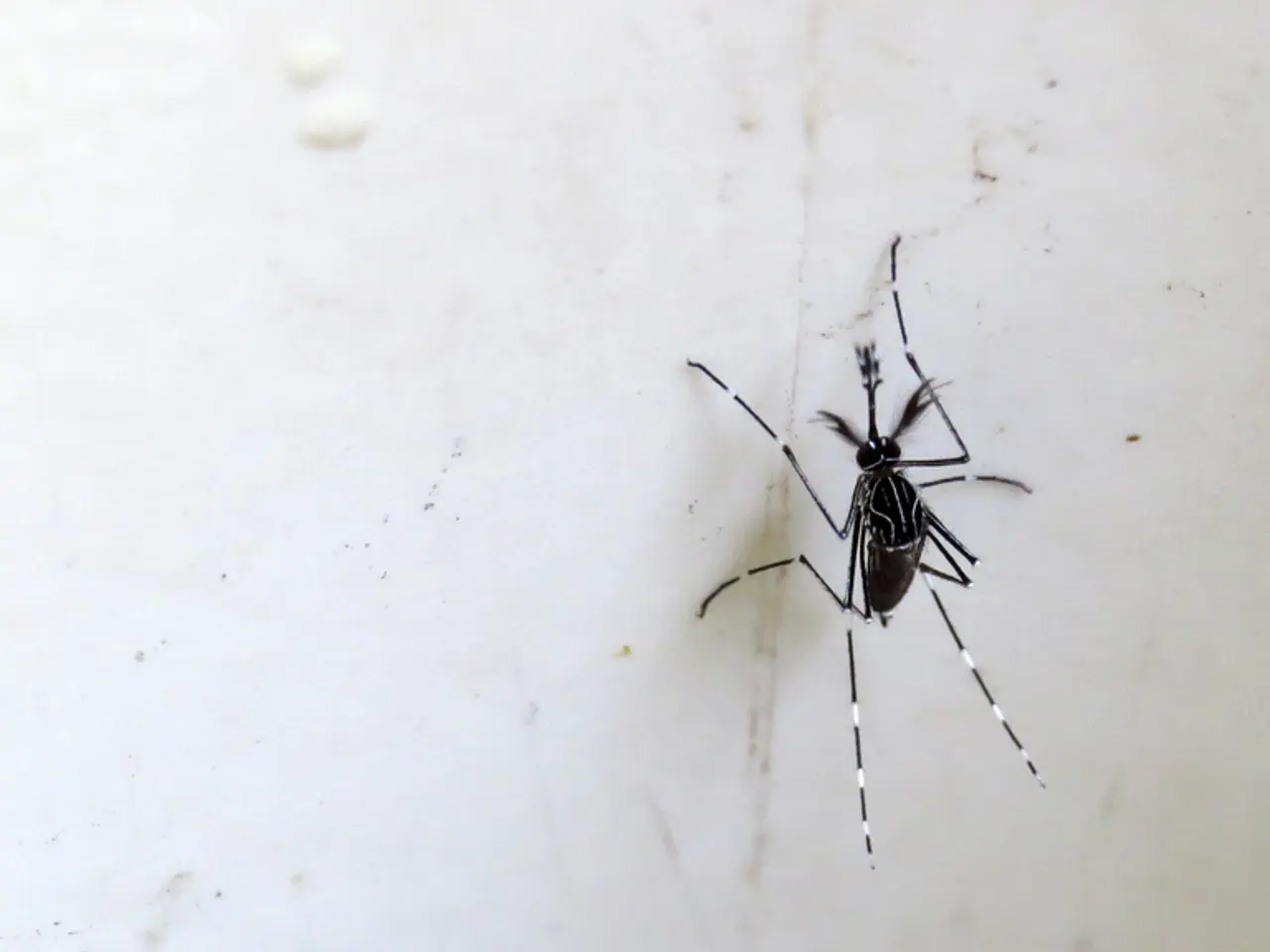West Nile virus claims its first life in Colorado of the 2025 season, prompting health authorities to advise on easy, efficient precautions for individuals spending time outdoors.
West Nile Virus Poses Threat in Colorado: CDPHE Issues Prevention Guidelines
Colorado is currently facing a rise in West Nile virus cases, with nine human cases confirmed in eight different counties this year. The Colorado Department of Public Health and Environment (CDPHE) has responded by issuing guidelines for prevention, urging residents to take precautions when spending time outdoors.
According to Dr. Ned Calonge, Chief Medical Officer at CDPHE, the West Nile virus can result in neurological disease, and it's essential for individuals to prioritize personal protection. Symptoms of the virus can include high fever, headache, stiff neck, disorientation, tremors, and coma.
The current prevention guidelines in Colorado emphasize four main strategies:
- Use insect repellents: Repellents containing EPA-registered ingredients such as DEET, picaridin, IR3535, oil of lemon eucalyptus, or para-menthane-diol should be used, following label instructions.
- Limit outdoor activities at dawn and dusk: These are the times when mosquitoes that carry West Nile virus are most active.
- Wear protective clothing: Long sleeves, long pants, and socks are recommended, along with applying repellent to clothing when in areas with mosquito activity. Clothing treated with Insect Shield technology can provide additional protection.
- Reduce mosquito breeding sites: Standing water should be removed weekly from yards, gutters, and containers. Treat water that cannot be drained with Bti larvicide, and ensure homes are equipped with properly functioning window and door screens to keep mosquitoes out.
These recommendations are strongly endorsed by state and local health departments, including the CDPHE and Larimer County Health officials, given the high mosquito infection rates and past human cases.
Larimer County, in particular, has reported a very high vector index, indicating an elevated risk. Older adults and people with certain medical conditions should be especially cautious, as they are more vulnerable to severe West Nile disease.
Weekly updates on West Nile virus activity and guidance can be found on official Colorado public health websites to stay informed throughout the mosquito season. The best hiking shirts and pants can provide additional protection and comfort during outdoor activities.
Unfortunately, the virus has been found in mosquitoes in eight of the 16 counties where testing has taken place this season, and the Colorado Department of Public Health and Environment has announced the first death from West Nile virus in the state this year.
The best practices for reducing West Nile virus risk during the 2025 season are often summarized as the “Four D’s” (Dress, Defend, Drain, Dusk/dawn avoidance). By adhering to these guidelines, residents can help protect themselves and their communities from the dangers of West Nile virus.
- Science reveals that the West Nile virus can lead to chronic neurological diseases in individuals.
- To combat sleep-disturbing symptoms related to the West Nile virus, it's crucial to apply EPA-registered insect repellents during outdoor activities.
- Workplace wellness programs can educate employees about prevention guidelines for West Nile virus and other respiratory conditions.
- Medical conditions such as type-2 diabetes, chronic kidney disease, COPD, and cancer might make a person more susceptible to severe West Nile disease.
- In the workplace, workers with mental health issues may need special accommodations to prevent further complications related to the West Nile virus.
- Managing weight through proper nutrition and exercise is essential in maintaining overall health and preventing complications from chronic diseases like West Nile.
- Eye health can be impacted by West Nile virus, as it targets the central nervous system and can cause vision-related issues.
- Hearing loss and tinnitus have been reported in some cases of West Nile virus, emphasizing the importance of ear health.
- Health and wellness programs should address various aspects of health, including a focus on digestive health, skin care, and sexual health.
- Fitness and exercise can help strengthen the immune system, reducing the risk of complications from West Nile virus and other diseases.
- Alzheimer's disease, autoimmune disorders, and neurological disorders can be exacerbated by the West Nile virus, making men and women of any age vulnerable.
- Proper skin care and regular dermatological check-ups can help detect early signs of skin conditions such as psoriasis, which may co-occur with West Nile virus.
- Medicare can cover some of the therapies and treatments for those affected by West Nile virus, ensuring access to necessary healthcare services.
- CBD products might help alleviate some symptoms of West Nile virus, such as pain and inflammation, depending on individual responses.
- Rheumatoid arthritis patients may experience joint pain and swelling when contracting the West Nile virus, requiring additional medical attention.
- Migraines are a common symptom for some individuals with West Nile virus, highlighting the need for proper neurological care.
- Cardiovascular health plays a crucial role in overall health, with a stronger heart offering better resistance to infections such as West Nile virus.
- Parenting guides can educate parents about the signs and symptoms of West Nile virus in children, ensuring proper medical care and prevention practices.




